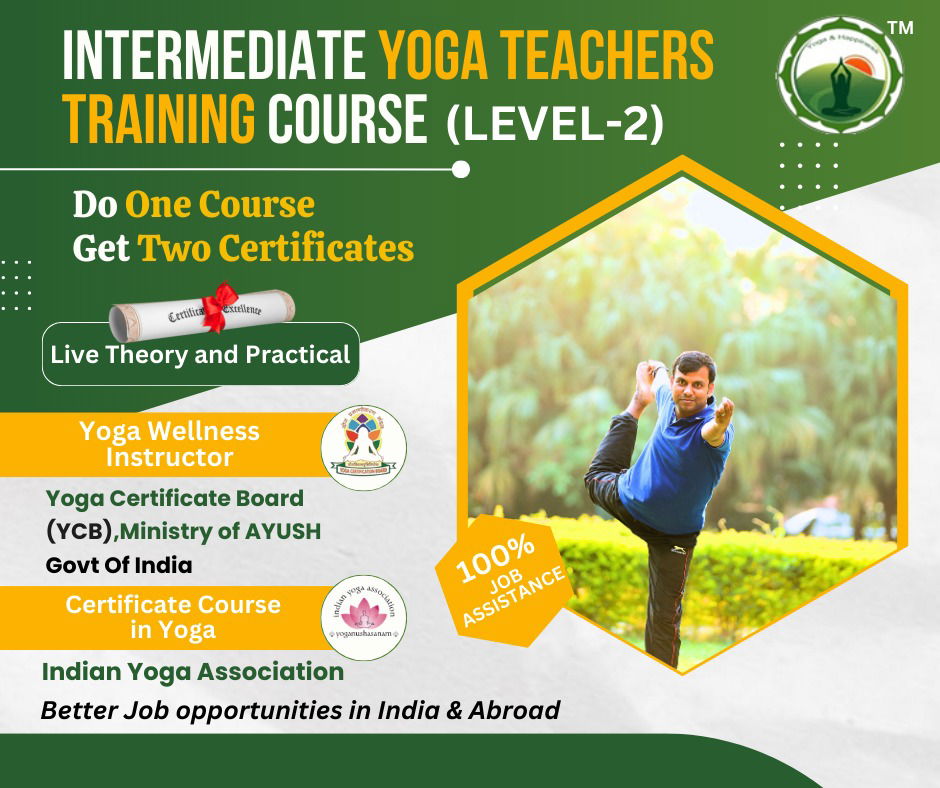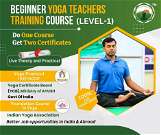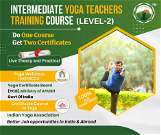Unit 1- Introduction to Yoga and Yogic Practices
1.1 Yoga: Etymology, definitions (Patanjala Yoga Sutra, Bhagwad Gita & Kathopanishad), aim, objectives and misconceptions.
1.2 Yoga: Its origin, history and development.
1.3 Brief Introduction to Samkhya and Yoga Darshana.
1.4 Life sketches and teachings of Yoga masters (Maharishi Ramana, Shri Aurobindo Swami Vivekananda, Swami Dayananda Saraswati).
1.5 Principles of Yoga and practices of healthy living.
1.6 Principles and Practices of Jnana Yoga.
1.7 Principles and Practices of Bhakti Yoga.
1.8 Principles and Practices of Karma Yoga.
1.9 Concept and principles of Sukshma Vyayama, Sthula Vyayama, Surya Namaskara and their significance in Yoga Sadhana.
1.10 Concept and principles of Shatkarma: Meaning, Types, Principles and their significance in Yoga Sadhana.
1.11 Concept and principles of Yogasana: Meaning, definition, types and their significance in Yoga Sadhana.
1.12 Concept and principles of Pranayama: Meaning, definition, types and their significance in Yoga Sadhana.
1.13 Introduction to Tri Bandha and their health benefits.
1.14 Dhyana and its significance in health and well being.
1.15 Introduction to Yogic relaxation techniques with special reference to Yoga Nidra.
Unit -2 Introduction to Yoga Texts
2.1 Introduction to Prasthanatrayee, Purushartha Chatushtaya and goal of human life.
2.2 Yoga in Kathopnishad, Prashanopanisha, Tattriyopnishad with special emphasis on Panchakosha Vivek and Ananda Mimamsa.
2.3 Concept of Sthitaprajna, Bhakti, Karma and Dhyana in Bhagavad Gita.
2.4 Significance of Bhagavad Gita in day to day life.
2.5 Concept of healthy living in Bhagavad Gita (Ahara, Vihara, Achara, Vichara).
2.6 Study of Patanjal Yoga Sutra including selected sutras from following chapters (I- 1 to 12, II- 46 - 51, III- 1 to 4).
2.7 Concept of Chitta, Chitta Bhumi, Chitta Vritti, Chitta Vikshepa, Chittaprasadanam and their relationship with wellness.
2.8 Bahiranga Yoga of Maharishi Patanjali (Yama, Niyama, Asana, Pranayama, Pratyahara).
2.9 Antaranga Yoga of Maharisi Patanjali (Dharana, Dhyana, Samadhi).
2.10 Concept of mental well being according to Patanjala Yoga.
2.11 Hatha Yoga: Its parampara, knowledge of basic Yoga texts (Hatha Pradipika and Gherand Samhita). Relationship between Hatha yoga and Raja Yoga.
2.12 Sadhaka and Badhaka tatva, principle to be followed by Hatha Yoga practitioner.
2.13 Concept of Matha, Mitahara, Pathya & Apthaya.
2.14 Concepts of Nadis, Prana and Pranayama for Subjective experiences.
2.15 Knowledge of Hatha Yoga practices for wellness (Shatkarma, Asanas, Pranayama, Mudra, Nadaanusandhana).
Unit 3- Yoga for Wellness
3.1 General introduction to human body and nine major systems of human body.
3.2 Introductions to sensory organs (Eyes, Nose, Ears, Tongue and Skin).
3.3 Basic functions of nine major systems of human body and homeostasis.
3.4 Yogic concept of health and wellness.
3.5 Concept of Tridoshas, Sapta Dhatu, Agni, Vayu and Mala; their role in wellness.
3.6 Concepts of Dinacharya and Ritucharya and their importance in well being.
3.7 Importance of Ahara, Nidra and Brahmacharya in well being.
3.8 Yogic concept of mental hygiene: Maître, Karuna, Mudita & Upeksha).
3.9 Importance of psychosocial environment for health and wellness.
3.10 Yogic concept and principles of Ahara(Mitahara, Yuktahara).
3.11 Health benefits of Suryanamaskara, Shatkarma, Asanas, Pranayama and practices leading to Dhyana (as per the practical syllabus of the course).
3.12 Salient features and contra indications of Yoga practices for well being (as per the practical syllabus of the course).
3.13 Knowledge of common diseases; their prevention and management by Yoga.
3.14 Knowledge of role of Yoga in the management of non communicable diseases.
3.15 Concept of stress and Yogic management of stress and its consequences.
Yoga Practical
1. Prayer
1.1 Concept and Recitation of Pranava
1.2 Concept and Recitation of Hymns
1.3 Selected universal prayers, invocations and Nishpatti Bhava.
2. Yogic Shat Karma
2.1 Neti: Sutra Neti and Jala Neti
2.2 Dhauti: Vamana Dhauti (Kunjal)
2.3 Kapalbhati (Vatakrama)
3. Yogic Sukshma Vyayama and Sthula Vyayama
a. Yogic Sukshma Vyayama (Micro circulation practices)
Neck Movement
Griva Shakti Vikasaka ( I,II,III,IV)
Shoulder Movement
Bhuja Valli Shakti Vikasaka
Purna Bhuja Shakti Vikasaka
Trunk Movement
Kati Shakti Vikasaka (I, II, III, IV, V )
Knee Movement
Jangha Shakti Vikasaka (II-A&B )
Janu Shakti Vikasaka
Ankle movement
Pada-mula shakti Vikasaka – A&B
Gulpha-pada-pristha-pada-tala shakti Vikasaka
b. Yogic Sthula Vyayama (Macro circulation practices)
Sarvanga Pushti
Hrid Gati (Engine daud)
4. Yogic Surya Namaskara with Mantra
5. Yogasana
5.1 Tadasana, Hastottanasana, Vrikshasana
5.2 Ardha Chakrasana, Padahastasana
5.3 Trikonasana, Parshva Konasana, Katichakrasana
5.4 Dandasana, Padmasana, Vajarasana,
5.5 Yogamudrasana, Parvatasana
5.6 Bhadrasana, Mandukasana, Ushtrasana, Shashankasana, Uttana Mandukasana,
5.7 Paschimottanasana, Purvottanasana
5.8 Vakrasana, Ardha Matsyendrasana, Gomukhasana
5.9 Makarasana, Bhujangasana, Shalabhasana, Dhanurasana
5.10 Pavanamuktasana and its variations
5.11 Uttanapadasana, Ardha Halasana, Setubandhasana, Sarala-Matsyasana
5.12 Shavasana,
6. Preparatory Breathing Practices
6.1 Sectional Breathing (Abdominal, Thoracic and Clavicular Breathing)
6.2 Yogic Deep Breathing
6.3 Anuloma Viloma/ Nadi Shodhana
7. Pranayama
7.1 Concept of Puraka, Rechaka and Kumbhaka
7.2 Ujjayee Pranayama (Without Kumbhaka)
7.3 Sheetalee Pranayama (Without Kumbhaka)
7.4 Sitkaree Pranayama (Without Kumbhaka)
7.5 Bhramaree Pranayama (Without Kumbhaka)
8. Concept and Demonstration of Bandha
8.1 Jalandhara Bandha
8.2 Uddiyana Bandha
8.3 Mula Bandha
9. Concept and Demonstration of Mudra
9.1 Yoga Mudra
9.2 Maha Mudra
9.3 Vipareetakarani Mudra
10. Practices leading to Dhyana Sadhana
10.1 Body awareness and Breath awareness
10.2 Yoga Nidra
10.3 Antarmauna
10.4 Recitation of Pranava and Soham
10.5 Recitation of Hymns
10.6 Practice of Dhyana
B. Teaching Skills (Methods of Teaching Yoga)
1.1 Teaching methods with special reference to Yoga
1.2 Factors influencing Yoga teaching
1.3 Need of teaching practice and its use in Yogic practice.
1.4 Teaching Aids : Meaning and Need, Role of Language, Voice, Fluency, Clarity and Body language in an ideal presentation
1.5 Methods of teaching Yoga to an individual, small group and large group
1.6 Lecture cum demonstration in Yoga: Its meaning, importance and method of its Presentation
1.7 Lesson plan: Its meaning and need
1.8 Preparation of lesson plan in Yoga, Preparation of lesson plan for an individual and for a group
1.9 Presentation of lessons in specific Yogic practices: Kriya, Asana, Pranayama, and Dhyana.
1.10 Assessment of a Yoga class (detection and correction of mistakes).



